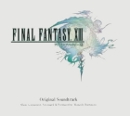
|
|
Lux-Pain ~ Lux-Sound :: Review by Chris
 |
Album Title: | Lux-Pain ~ Lux-Sound |
| Record Label: | Marvelous Entertainment | |
| Catalog No.: | Promotional | |
| Release Date: | March 27, 2008 | |
| Purchase: | Buy at eBay |
Overview
When it was first announced, Lux-Pain seemed like a low-key DS adventurous with a few quirky gameplay features. However, Marvelous Entertainment have created quite an elaborate marketing campaign for the title, providing an art book, some radio broadcasts, a vocal single, and, soon, a soundtrack CD. They hired two fairly big names to compose the soundtrack — Kenji Ito, who is well-known for the SaGa, Mana, and Culdcept series, and Yasuyuki Suzuki, who has dabbled in Operation Logic Bomb, Tail of the Sun, and Space Invaders Extreme. Lux-Sound was packaged with the Japanese release of the game and features eight initial production versions of the game's themes and a 30 minute radio broadcast.
Body
Kenji Ito's themes are very similar to his work on other soundtracks. "KIRIE" uses the combination of mellow woodwind melodies against rich quasi-epic accompaniment commonly featured on the Culdcept Saga, though it lacks emotional effect in part due to low definition on the DS. "Σ -Sigma-" is a mundane ambient piece featuring suspended vocal notes doubled by suspended strings and a drab static accompaniment. "Silent Beat" is an action track and slightly more creative and memorable; the beat creates a decent rhythm here and the warped melodies give a touch of originality. "Fort -Fortress-" is reminiscent of the new age pieces on Culdcept Saga, featuring a slow string melody against uplifting synth pads. Lacking refinement or development, these themes sound like cuts that didn't quite make it to Ito's older soundtracks but are more likely the result of his brutal efficiency writing functional music in time for the deadline.
Yasuyuki Suzuki's musicianship contrasts with Ito's but his music does little to redeem the soundtrack. The ethereal "Lux de Luna" benefits from a little more freedom than "Fort -Fortress-", offering a slightly more fitting beat and some expressive violin wails. "Dark Noise" is almost as derivative as "Σ -Sigma-" with suspended strings and clichéd crisis motifs being the focus of a very underdeveloped work. "Twilight" is another uplifting electronically-tinged piece of music that has dabs of jazzy piano work; it would definitely work well in the game, but it's unfortunate that this underwhelming composition is probably also the best on the CD. "Malum" is another jazzy piano-based work punctuated by some novelty synth sounds that attempt to create humour but actually constitute an awkward desperate component of another lifeless composition. Overall, Suzuki's work feels a bit less rigid and predictable than Ito's contribution, but lacks effort or exuberance.
The rest of the soundtrack features the 30 minute "Radio Seagull" broadcast. Hosts Eri Kitamura and Naoki Koshida offer enthusiastic performances and seem to have warm chemistry, though their actual conversations will be lost on non-Japanese speakers. The occasional accompanying background music fits nicely and offers an insight into a few other tracks, though they all seem unremarkable. There seems to be relatively little difference between the sound quality of these samples and the initial production versions so the soundtrack will probably be at the lower end of the DS' quality range. Overall, the radio broadcast is a nice touch to this bonus CD, although even most Japanese speakers will probably not want to hear it all.
Summary
Overall, this promotional CD is a nice bonus to those that bought Lux-Pain in Japan. However, it isn't a promising insight into what the Lux-Pain Original Soundtrack will be like. Kenji Ito seems to be almost completely on auto-pilot producing some of his most mind-numbing material in years. Yasuyuki Suzuki doesn't appear to be the collaborator Ito needs to redeem one of his soundtracks from mediocrity. The Lux-Pain Original Soundtrack might well end up being Ito's weakest soundtrack to date.

